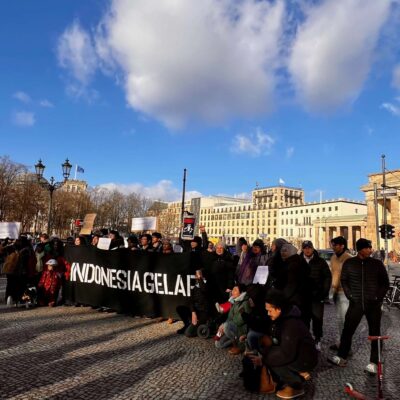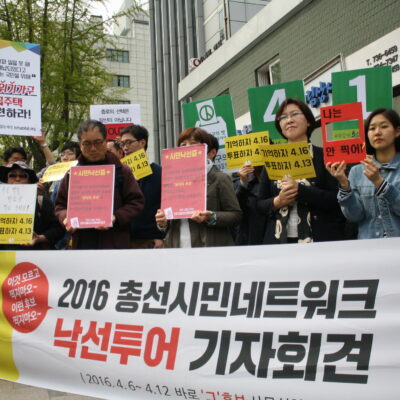India’s religious, ethnic and linguistic minorities experience significant discrimination and generally hold lower socio-economic status than the Hindu majority. Reports have found that religious minorities such as Muslims and Christians suffer from higher unemployment rates compared to Hindus; and despite being mostly educated, joblessness is highest among Christians. Muslims generally have the lowest work participation rate. However, the Indian government is withdrawing from many areas of social welfare, leaving religious minorities in an even more precarious situation. In this context, several non-state actors, especially faith-based civil society organisations, have emerged to protect and advance the rights and interests of religious minorities.
Since 2014, India has been led by the conservative Hindu nationalist political party, the BJP, which has a complex relationship with civil society organisations. It often discredits faith-based and secular organisations that work with minority groups.
Religious minorities – discrimination and exclusion
India is home to a diverse, fluid and overlapping array of religious identities and traditions. Policies associated with British colonial rule have deeply influenced the framing of religious communities as rigid, homogenous and institutionalised categories, separate from one another. It has also led to the polarised distinction between ‘majority’ and ‘minority’ communities. Consequently, ‘minority rights’ is generally regarded as relating to the claims and protections of religious groups other than the numerically and ethnically dominant Hindu identity. Social groups that are designated as minorities by the Indian state include Muslims, Christians, Buddhists, Sikhs and Jains who comprise 19.3 percent of India’s population as per the 2011 Indian Census. Among these, Muslims constitute 14.2 percent and Christians, 2.3 percent.
The Constitution of the post-colonial Indian state was founded on principles of equality, plurality and inclusivity. It aimed to protect the fundamental rights of every citizen such as the right to equality, the right to freedom of religion and cultural and educational rights. However, despite these constitutional provisions, accommodating the rights of cultural minorities has been a constant challenge for the postcolonial Indian nation-state. Very often minorities have been subjected to violence and brutality. As studies have shown, the political history of the postcolonial state has been marked by Hindu-Muslim and Hindu-Christian conflicts. Most recently, in 2019, a finding by the Pew Research Center has shown that among the 25 most populous countries in the world, India has the highest degree of ‘social hostilities’ based on religious identity, ranging from harassment to large scale mob violence. In 2022, The U.S. Commission on International Religious Freedom (USCIRF) found India responsible for severe violations of the universal right to religious freedom, for the third year in a row. It recommended the US government designate India as a ‘country of particular concern’ for ‘engaging in and tolerating systematic, ongoing and egregious violations of religious freedom’. However, the Indian government has rejected the observations of the USCIRF and described it as an ‘organisation of particular concern’.
Religious minority groups disproportionately face poverty and underdevelopment. In 2006, the Sachar Committee report was the first official data to be gathered regarding the socio-economic conditions of any religious minority. The Committee was instituted by then Prime Minister Manmohan Singh to investigate the status of Muslims and highlighted the stark underrepresentation of Muslims in social, economic and educational spheres, and in some indices, even below that of Dalits and Adivasis (Scheduled Castes and Scheduled Tribes) of India. It particularly noted that ‘one fourth of Muslim children in the age group of 6-14 years have either never attended school or did not finish their education. For children above the age of 17 years, the educational attainment of Muslims at matriculation is 17 percent, compared with the national average of 26 percent. Only 50 percent of Muslims who complete middle school are likely to complete secondary education, compared to 62 percent at the national level. Similarly, the Ranganath Mishra Commission of 2007 highlighted the socio-economic disadvantage of religious and linguistic minorities and recommended the government extend affirmative action policies to some of the excluded groups such as the low caste Dalits who convert to Islam or Christianity.
India has a long history of religious conversions by low caste Dalits and tribes to escape discrimination and exploitation associated with the caste-based Hindu society. Dalit populations, upon conversion to Christianity and Islam, are excluded from the Scheduled Caste category and consequently lose their access to benefits and privileges associated with state-based affirmative action or, what is commonly known in India as, the reservation policy. They continue to be excluded even though the National Commission for Minorities has presented evidence of extreme deprivation (social, occupational, educational) faced by Dalit Christians and Muslims. Although the decision on the demand by Dalit Christians and Muslims to be recognized as Scheduled Castes is long pending in India, a major Supreme Court decision (K. P. Manu versus Chairman, Scrutiny Committee for the Verification of Community Certificate) has ensured that once an individual reconverts to their former religion Hinduism, Dalit status is resuscitated. This is an active form of disincentivising Dalit and tribal communities who are considered to be within the fold of Hinduism, and are penalised upon converting to minority religious groups such as Islam and Christianity that are considered to be ‘foreign religions’.
Faith-based civil society organisations and protecting religious minorities’ rights and interests
Since India’s independence, the nation’s first prime minister Jawaharlal Nehru adopted a modernist, secular developmental vision for the Indian state, and religion was perceived to be a divisive and contentious force. This has been reinforced by some academic literature, such as work by Indian scholars Kaviraj and Beteille who argue that civil society is a secular sphere. For them, religious and caste-based organisations are pre-civil in nature; they are hierarchical and opposed to the idea of individual autonomy and freedom, and hence should be excluded from civil society.
However, several other scholars such as Lloyd Rudolph have noted that caste and religious organisations have played a vital role in India’s democracy since the beginning; they represent what may be called ‘modernity of tradition’ and thus, cannot be viewed as outside the domain of civil society. Added to this, the rise of religious nationalism and the increasing visibility of religious groups in the public sphere is telling of the fact that religion continues to be a crucial force in Indian civil society. Recognising the entanglements between religion and development in the contemporary world, Clarke and Jennings argue that far from being vestiges of tradition, religion, faith and spiritual belief ‘reflect value systems that have not just endured, but also evolved to meet the new demands of a global economy and society that are increasingly interconnected’.
Faith-based organisations have become imperative to the development discourse because of the recognition that development agencies and organisations who work in the midst of complex cultural settings cannot neglect engagement with a key associational arena of civil society i.e., religion and the faith identities, values and customs of the communities they work among.
As discussed above, a large section of the minority population, especially Dalit Christians and Muslims, suffer from poverty, landlessness, and underdevelopment; they face several forms of discrimination, and are also excluded from the government’s affirmative action benefits. Despite many petitions, several governments across party lines have systematically ignored their requests to be recognised for reservation. The failure of the state to respond to the problems of religious minorities has opened up the scope for non-state faith-based organisations (FBOs) to emerge within civil society. In particular, several FBOs have accepted transnational funding and aid money to institute their own development/welfare programmes on health, education, and poverty alleviation. Some examples include the presence of church-based NGOs set up by Christian missionaries, Muslims organisations such as Jamaat-e-Islami Hind, as well as Hindu nationalist organisations such as the RSS and Vanvasi Kalyan Ashram.
The Foreign Contribution Regulation Act and faith-based organisations
The Foreign Contribution Regulation Act (FCRA) was established in 1976 by then Prime Minister Indira Gandhi to monitor the utilisation of foreign funding received by NGOs in India to ensure accountability and transparency. Since its inception, various governments have used the FCRA as a tool to control and coerce civil society to varying degrees. However, it is observed that the BJP-led government has become highly intolerant of secular/faith-based organisations whose interests are perceived by it to be contradictory to the (Hindu nationalist) state and it uses the FCRA as a tool to restrict their funding. Reports suggest that since 2014, the BJP-led government has revoked permission for more than 16,000 NGOs to receive foreign funding.
The Foreign Contribution (Regulation) Amendment Bill, 2020, has been criticised by civil society organisations as the government seeks to increase restrictions on the already strict compliance requirements by which NGOs have to abide. One of the explanations provided for the requirement of this Bill is that civil society organisations are using foreign money meant for development for illicit proselytisation activities. Since January 2022, the central government of India cancelled the FCRA registration of 6,003 NGOs, which means they will no longer be allowed to receive foreign contributions; and they are also not allowed to utilise the funds they have already received. Several of the NGOs in this list are faith-based organisations that are working for the educational, health, and socio-cultural development of minority ethnic and religious groups. Particularly, for faith-based organisations, the charges laid to revoke their licenses are that they are engaged in ‘forced religious conversions’. Under Section 12 (4) of the Foreign Contribution (Regulation) Act, 2010, the registration certificates of NGOs can be revoked if they are found to be ‘indulging in activities aimed at conversion through inducement or force, either directly or indirectly, from one religious faith to another’. Most of the organisations charged with this allegation are Christian NGOs, including some prominent ones which have been working on the ground for many decades.
One organisation to which the government denied license renewal is the well-known Kolkata based ‘Missionaries of Charity’ that was established by Mother Teresa, stating that they have found ‘adverse inputs’, without further clarification. Before this declaration, Hindu rights groups had filed a police complaint that the organisation used its charity homes to force young girls to adopt Christianity. After the government faced strong opposition, the Missionaries of Charity’s FCRA licence was renewed, which will remain valid until 2026. Additionally, in 2021 alone, out of six NGOs whose FCRA licences were suspended, four were Christian organisations (based in Jharkhand, Manipur, Mumbai).
Revoking the FCRA licences of minority faith-based organisations makes them vulnerable in relation to the state. Christian charitable organisations, which have established their branches in particularly poor regions of the country and have engaged in charitable and development activities such as distribution of resources, provision of employment opportunities, setting up of child-care institutions, education and health units, are contributing to the economic and social mobility of marginalised communities. However, with the ascendance of majoritarian religious nationalism, such Christian FBOs have been accused by the government and Hindu conservatives of converting poor, Adivasi and Dalit communities and orphaned children through ‘force’, ‘fraud’ and ‘allurement’, under the guise of charitable work conducted with the utilisation of ‘foreign funding’. Within this narrative, it is assumed that marginalised communities convert due to the promise of financial reward and no account is taken of their agency regarding their religious identities. This is also reflected in the language of anti-conversion laws in India that criminalises conversion by means of ‘force’, ‘fraud’ and ‘allurement’, categories that are so vaguely defined that they can easily pose a threat to FBOs. For example, since allurement is defined within certain laws as a ‘gift or gratification in cash and kind’, charitable and aid-based organisations that may be involved in the distribution of services or other resources motivated by theological and developmental commitments can easily fall within these categories.
Christian FBOs are not the only ones affected. In June 2021, the Islamic Dawah Centre, a Muslim organisation working with deaf and mute students, was subjected to an investigation by Uttar Pradesh’s Anti-Terrorist Squad for mass conversion activities, resulting in the arrest of two Muslim clerics, Mohammad Umar Gautam and Mufti Qazi Jahangir Alam Qasmi. It was alleged that they were responsible for using psychological manipulation to convert students to Islam and were funded by the ISI, Pakistan’s intelligence agency. This is despite the fact that students have come forward to publicly provide testimonies and deny these charges. In the chargesheet, the two individuals who were the founders of the Islamic Da’wah Centre were accused of ‘changing the population balance in the country’. This reflects an underlying demographic anxieties about the Hindu population being reduced to a minority even though data suggests that Hinduism gains as many people it loses through conversion and therefore, conversion does not pose any real threat to the Hindu community. Such concerns are reflected in the state intervention into the activities of civil society organisations by attempting to police the disbursal of welfare to specific populations.
Apart from restricting the funding of minority faith based organisations, it was reported in 2021 that government financial auditors were questioning hundreds of NGOs about directing funds towards Muslim and Dalit beneficiaries. They were particularly questioned regarding the flow of funds towards the 2019 CAA (Citizenship Amendment Bill) – protests that saw significant participation by the Muslim community. The report also states that auditors singled out Muslim employees, demanding to see evidence that might suggest political allegiances.
Such allegations are not made against majoritarian Hindu organisations such as the RSS, which receive massive financial support from the Indian diaspora. Scholar Chad Bauman cites a 2014 report published by South Asia Citizens Web stating that between 2002 and 2012 the family of Hindu nationalist organisations in India, popularly known as the Sangh Parivar, has received more than US$50 million from the United States. Similarly, Hindu nationalist organisations are not subject to allegations of proselytisation as Church-based NGOs are despite the overt visibility of Hindu religious expressions, ranging from the proliferation of yoga centres, celebration of Hindu festivals to teaching Hindu prayers and greetings in primary schools for children from Adivasi communities – forms of action that could be categorised as proselytisation. This differential attitude is shaped by the notion that while Christianity and Islam are ‘foreign religions’ that are imposed on marginalised communities by Islamic and Christian organisations, Hindu nationalist organisations work towards returning low caste and tribal communities to their ‘original religion’ i.e. Hinduism.
Conclusion
It is not enough to view religion as either advancing or restricting the goals of development. Instead, it is important to recognise that the domains of both religion and civil society are neither fixed and nor value neutral. The increasing number of faith-based organisations in India and the entanglements of the religious and the secular demand more research to explore the new ways in which the state mediates the realm of civil society to advance its own interests.
Seeing conversion as a threat to the idea of the (Hindu) nation, the Indian state has often used the strict FCRA rules to ban such minority FBOs and limit their activities. We conclude that allegations of promoting religious conversions against such NGOs amplify their selective susceptibility to the cancellation of licenses, arrests, violence and vandalism. We also conclude that the state adopts divergent ways in its interactions with different faith-based civil society organisations to expand its authority.
Authors: Ananya Pattnaik, PhD Candidate, Department of Humanities and Social Sciences, Indian Institute of Technology Delhi; and Professor Sarbeswar Sahoo is Professor of Sociology in the Department of Humanities and Social Sciences, Indian Institute of Technology Delhi.
Image: A market near Jama Masjid, New Delhi, India. Credit: Mark/Flickr.




